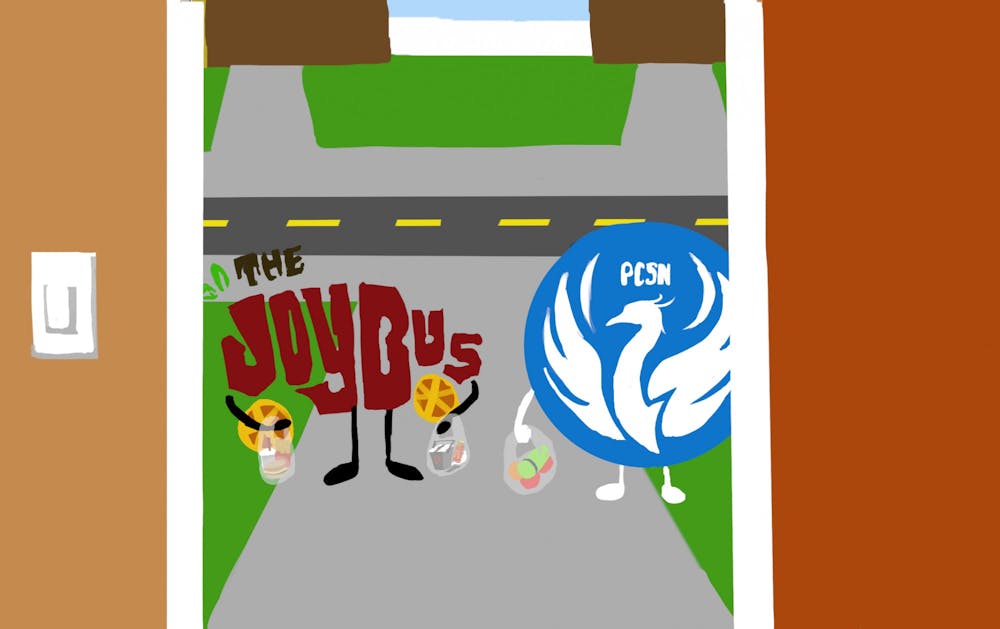An ASU student is helping lead a partnership between Phoenix Cancer Support Network, a non-profit organization that provides transportation and other assistance to cancer patients, and The Joy Bus, a not for profit organization that supplies homebound cancer patients with fresh meals.
Two years ago, the two organizations connected with each other and began discussing how they could collaborate. After some obstacles in planning, the partnership began making weekly grocery and meal deliveries to cancer patients in early April.
Adam Thompson, a senior studying psychology and applied biological sciences, began working with PCSN a year and a half ago as an intern and was recently promoted to intern and volunteer supervisor and leader of the client relations team.
One of his most recent projects was kicking off the partnership between PCSN and The Joy Bus.
Thompson said he became interested in working with PCSN because he has watched two members of his family battle cancer. He wants to be a physician and hopes the experience of working with PCSN gives him a better understanding of how to provide care to vulnerable populations.
“I definitely wanted to see how I can make an impact on my community as it relates to cancer patients, especially those who are vulnerable, you know, communities of color, low-income individuals, and that's exactly the kind of people that we serve within the cancer community itself,” Thompson said.
Currently, the partnership serves four homebound cancer patients who are clients of PCSN. Megan Norton, program director of The Joy Bus, said the partnership with PCSN is allowing The Joy Bus to expand its delivery radius beyond its normal constraints in order to help some of PCSN's clients.
The partnership delivers meals and groceries to these patients once weekly, but PCSN and The Joy Bus hope to add more names to the list of recipients as the partnership grows.
Thompson participates both in delivering meals to patients and the administrative side of the partnership, tracking client demographics and data.
Because of COVID-19 and the risks it poses to cancer patients, many of whom are immunocompromised, the two organizations have had to greatly scale back the social support components of their services.
Before the pandemic, volunteers at The Joy Bus would help with personal tasks like taking out clients’ garbage while delivering meals and can no longer do that.
“It's actually pretty heartbreaking,” Norton said.
“(The patients are) not allowed to have any contact, which is really difficult because ... that's a really big component of our program and something we're very proud of and that we do differently than other organizations.”
The role of PCSN has changed as well since the beginning of the pandemic. Jenny Martin, founder and CEO of PCSN, said demand for services from the organization has risen sharply as other organizations have suspended their assistance programs due to COVID-19.
She anticipates the current limited access to assistance programs for cancer patients as well as a slow in cancer screenings will lead to a rise in cancer diagnoses and advanced-stage cancers after the pandemic.
Both PCSN and The Joy Bus rely heavily on donations to continue their services. The Joy Bus Diner, the restaurant that directs all of its proceeds to services offered by The Joy Bus, closed due to financial strain from COVID-19. Martin said PCSN is 100% donation-run.
“I'm scared all the time that the money is going to run out, but by the grace of God or whatever you believe in, we keep getting support and donations,” Martin said.
“Any dollar that is given to us goes to buying food for cancer patients or goes to getting them to their doctor's appointment or goes to making sure that they have a clean house to come home to after they get out of the hospital.”
Thompson said for anyone looking to enter the health care field, it is important to get experience at a grassroots level, directly interacting with members of the community and working to understand their experiences.
“Being able to directly interact with the communities that I've been able to through Phoenix Cancer Support Network has been an invaluable experience for me and has opened up my eyes to seeing so many of the health disparities that I've learned of,” Thompson said.
“Having that grassroots perspective going into the healthcare field and understanding the consequences that your diagnosis could bring to your patients is definitely an important thing to have, I think, for all health care providers.”
Reach the reporter at gforslun@asu.edu and on Twitter @GretaForslund.
Like The State Press on Facebook and follow @statepress on Twitter.




